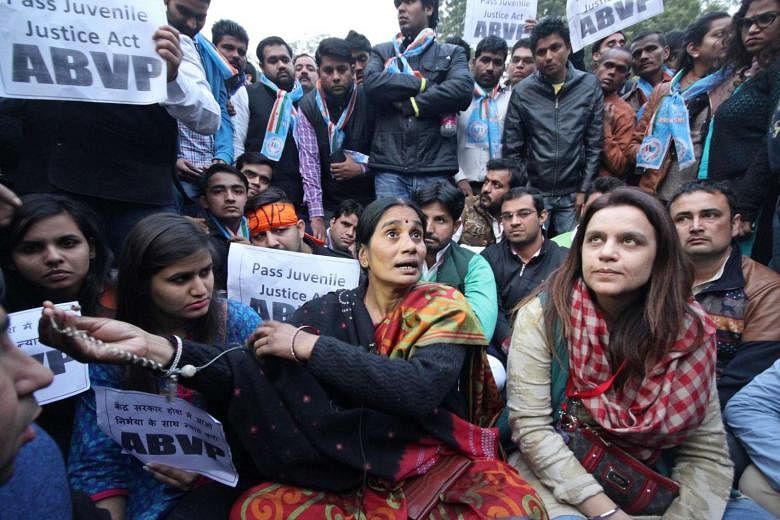NEW DELHI (AFP)- Indian lawmakers on Tuesday (Dec 22) passed a bill allowing harsher punishments for juveniles aged 16 to 18 after an outcry over the release of a young rapist who served three years in a detention facility for his part in a notorious gang-rape in 2012.
"I think the ayes have it, the ayes have it, the ayes have it. The bill has been passed," P.J. Kurien, a speaker of the upper house of parliament, said after a day-long debate on the bill.
The release two days ago of the youngest convict in the case of the fatal gang-rape of medical student Jyoti Singh in Dec 2012 triggered widespread calls for amendments to the existing law.
The changes to the law will allow minors aged 16 onwards to be sentenced to at least seven years in young offenders' institutions if convicted of "heinous crimes" including rape and murder.
However, they will not face the death penalty.
"#JuvenileJusticeBill attempts to bring balance between rights of the child and need to deter heinous juvenile crimes, esp. against women," Maneka Gandhi, the federal minister for women and child development, posted on Twitter after the bill was cleared.
Singh's parents, who watched the proceedings from the visitor's gallery of the parliament, welcomed the passage of the bill.
"I am satisfied that the bill has been passed in the upper house but somewhere deep down I feel sad that my own daughter never got justice," said Asha Singh, the victim's mother, as her eyes welled up.
The parents had led protests calling for the bill to be amended, labelling the existing law as too weak.
The new bill, which would replace the existing Juvenile Justice Act once the president signs the legislation, proposes a two-stage process that would first categorise crimes committed by juveniles as petty, serious or heinous.
A minor accused of a "heinous" crimes - such as rape, murder or acid attacks - would then be examined by a board of psychologists and social behaviour experts, who assess whether the defendant should be tried as a child or an adult.
Then the decision to try the culprit as an adult would need to be approved by a children's court, which would also draw up a plan for rehabilitation.
Gandhi said institutions would be established to house juveniles convicted of heinous crimes until they are 21 years old, after which they would be reviewed for release.
More than 1,000 juveniles above the age of 16 have been arrested for serious and heinous crimes in New Delhi - often dubbed as "India's rape capital" - in 2015, according to Gandhi.
Critics of the legislation argue this bill violates the United Nations Convention on the Rights of the Child, which India has ratified, and states that all people under the age of 18 must be treated equally.
The bill, which was passed by the lower house in May, had been listed for passage in the upper house during the ongoing winter session but proceedings have been hampered by perennial spats between the ruling Bharatiya Janata Party and opposition members.

